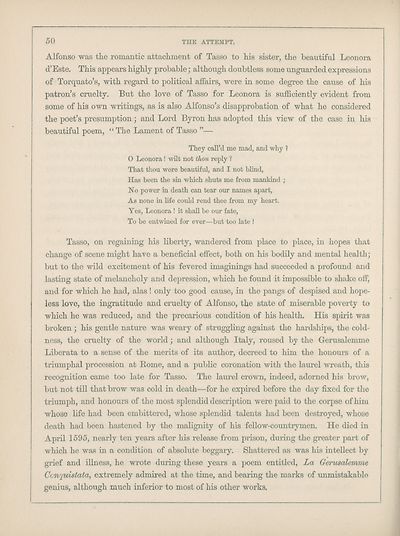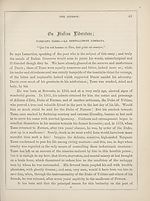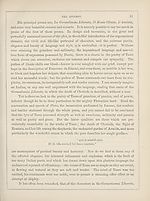Download files
Complete book:
Individual page:
Thumbnail gallery: Grid view | List view

50 THE ATTEMPT.
Alfonso was the romantic attachment of Tasso to his sister, the beautiful Leonora
d'Este. This appears highly probable; although doubtless some unguarded expressions
of Torquato's, with regard to political affairs, were in some degree the cause of his
patron's cruelty. But the love of Tasso for Leonora is sxifficiently evident from
some of his own writings, as is also Alfonso's disapprobation of what he considered
the poet's presumption; and Lord Byron has adopted this view of the case in his
beautiful poem, " The Lament of Tasso "—
They call'd me mad, and why ?
O Leonora ! wilt not thou reply ?
That thou were beautiful, and I not blind,
Has been the sm which shuts me from manltind ;
No power in death can tear our names apart.
As none in life could rend thee from my heart.
Yes, Leonora ! it shall be our fate.
To be entwined for ever—but too late !
Tasso, on regaining his liberty, wandered from place to place, in hopes that
change of scene might have a beneficial effect, both on his bodily and mental health;
but to the wild excitement of his fevered imaginings had succeeded a profoimd and
lasting state of melancholy and depression, which he found it impossible to shake off,
and for which he had, alas ! only too good cause, in the pangs of despised and hope¬
less love, the ingratitude and cruelty of Alfonso, the state of miserable poverty to
which he was reduced, and the precarious condition of his health. His spirit was
broken ; his gentle nature was weary of struggling against the hardshij^s, the cold¬
ness, the cruelty of the world; and although Italy, roused by the Gerusalemme
Liberata to a sense of the merits of its author, decreed to him the honours of a
triumphal procession at Rome, and a public coronation with the laurel wreath, this
recognition came too late for Tasso. The laurel crown, indeed, adorned his brow,
but not till that brow was cold in death—for he expired before the day fixed for the
triumph, and honours of the most splendid description were paid to the corpse of him
whose life had been embittered, whose splendid talents had been destroyed, whose
death had been hastened by the malignity of his fellow-countrjinen. He died in
April 1595, nearly ten years after his release from pi'ison, during the greater part of
which he was in a condition of absolute beggary. Shattered as was his intellect by
grief and illness, he wrote during these years a poem entitled. La Gerusalemme
Ccnquistata, extremely admii-ed at the time, and bearing the marks of unmistakable
genius, although much inferior to most of his other works.
Alfonso was the romantic attachment of Tasso to his sister, the beautiful Leonora
d'Este. This appears highly probable; although doubtless some unguarded expressions
of Torquato's, with regard to political affairs, were in some degree the cause of his
patron's cruelty. But the love of Tasso for Leonora is sxifficiently evident from
some of his own writings, as is also Alfonso's disapprobation of what he considered
the poet's presumption; and Lord Byron has adopted this view of the case in his
beautiful poem, " The Lament of Tasso "—
They call'd me mad, and why ?
O Leonora ! wilt not thou reply ?
That thou were beautiful, and I not blind,
Has been the sm which shuts me from manltind ;
No power in death can tear our names apart.
As none in life could rend thee from my heart.
Yes, Leonora ! it shall be our fate.
To be entwined for ever—but too late !
Tasso, on regaining his liberty, wandered from place to place, in hopes that
change of scene might have a beneficial effect, both on his bodily and mental health;
but to the wild excitement of his fevered imaginings had succeeded a profoimd and
lasting state of melancholy and depression, which he found it impossible to shake off,
and for which he had, alas ! only too good cause, in the pangs of despised and hope¬
less love, the ingratitude and cruelty of Alfonso, the state of miserable poverty to
which he was reduced, and the precarious condition of his health. His spirit was
broken ; his gentle nature was weary of struggling against the hardshij^s, the cold¬
ness, the cruelty of the world; and although Italy, roused by the Gerusalemme
Liberata to a sense of the merits of its author, decreed to him the honours of a
triumphal procession at Rome, and a public coronation with the laurel wreath, this
recognition came too late for Tasso. The laurel crown, indeed, adorned his brow,
but not till that brow was cold in death—for he expired before the day fixed for the
triumph, and honours of the most splendid description were paid to the corpse of him
whose life had been embittered, whose splendid talents had been destroyed, whose
death had been hastened by the malignity of his fellow-countrjinen. He died in
April 1595, nearly ten years after his release from pi'ison, during the greater part of
which he was in a condition of absolute beggary. Shattered as was his intellect by
grief and illness, he wrote during these years a poem entitled. La Gerusalemme
Ccnquistata, extremely admii-ed at the time, and bearing the marks of unmistakable
genius, although much inferior to most of his other works.
Set display mode to: Large image | Transcription
Images and transcriptions on this page, including medium image downloads, may be used under the Creative Commons Attribution 4.0 International Licence unless otherwise stated. ![]()
| Ladies' Edinburgh Debating Society publications > Attempt > Volume 3 > (64) Page 50 |
|---|
| Permanent URL | https://digital.nls.uk/104344000 |
|---|
| Attribution and copyright: |
|
|---|

